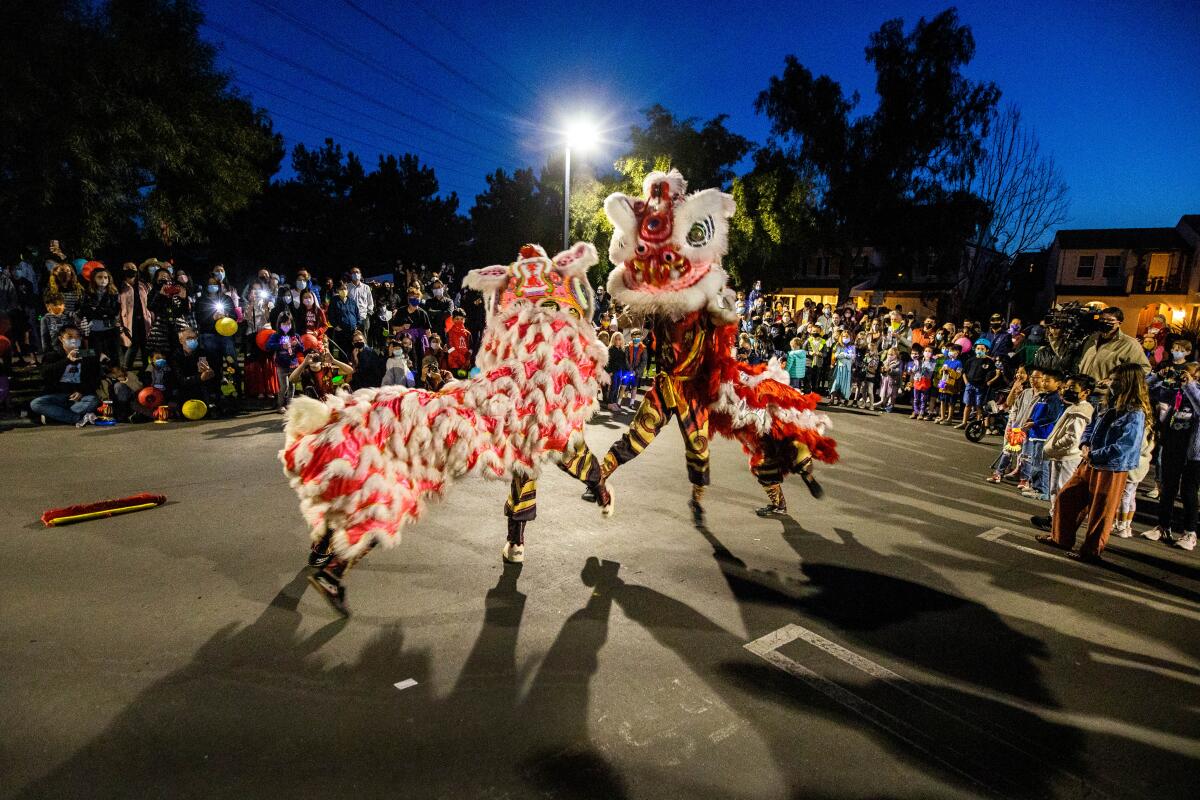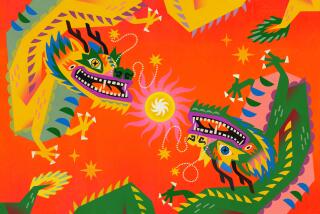Column: Feeling like the Grinch of Lunar New Year

Tuesday is Lunar New Year, and I confess that I’ve been feeling like something of a Grinch this year, or at least mildly Scrooge-like.
Perhaps there’s only so many cartoon zodiac animals I can take before wanting to punch one in the face. Maybe it’s the increasingly cheery corporate acknowledgments of Lunar New Year and seeing the holiday turned into a marketing campaign. Maybe it’s because I’m not able to go back to Taiwan this year and see my grandma, who passed away last year.
Actually, I probably won’t get to see a lot of my family for a long time, thanks to the pandemic and shifting travel requirements. But hey, at least Starbucks has a red and yellow mug, and Nike has some tiger-striped Lunar New Year Jordans.
It’s been amusing and confusing to see Lunar New Year transform from the quiet, family-centric holiday of my youth to one acknowledged, often clumsily, by a mainstream American public.
For me, the holiday has always been less about celebration and more about obligation. If we were in the States, we’d attend a potluck or a barbecue at a local park thrown by the local Chinese association. Toward midnight, my mom would call us to the kitchen and feed us a sweet, warm soup of tangyuan, the sweet balls of rice flour that you ingest to mark another year’s passing.
If we were in Taiwan, I’d be shuttled around to one living room altar after the other. My mom or my dad would hand me a stick of incense without explanation, and I would hold it as I went through the motions of bowing, wondering what it was I was supposed to be thinking or feeling during that moment.
As I got older, the holiday became an invaluable chance to connect with family. The price of admission was steep: plane tickets during Lunar New Year have elevated prices, and I would always have to bring a few hundred dollars of cash in red envelopes for my relatives, the traditional holiday gift. But the experiences were invaluable. I met relatives I never knew about and heard stories about my parents that changed the way I saw our family and myself.
By American standards for this holiday, which seem preoccupied with authenticity, my Taiwanese family’s Lunar New Year observations would probably not pass muster. We buy our authentic dishes precooked in a convenient “Lunar New Year” special bag from 7-Eleven. We observe what rituals we can remember — my aunts and uncles sometimes call or text older relatives mid-observance to clarify exactly what they’re supposed to be doing. We visit as many of our relatives as we can, but probably on the wrong days, in the wrong order.
American celebrations of Lunar New Year, to me, have never captured a family’s private joy in each other’s company. There’s a focus on rituals, and many of them are unfamiliar to me. Ultimately I’m glad that the holiday is observed more widely. I’m just trying to relate the strange sensation of watching your culture — something that’s been a part of you your whole life — suddenly feel like a costume you have to put on.
And this costume is a crowd-pleaser in bright red and gold, with lots of bowing, firecrackers and the striking of gongs.
I myself do not eat a whole fish, clean my house or cut my hair around Lunar New Year. I don’t set off firecrackers, visit the temple nor own any silk jackets. There’s nothing wrong with these traditions, colors or sounds. It’s just that after a lifetime of seeing them used in two-dimensional stereotypical portrayals of Chinese people, I’ve struggled to appreciate them for the proud displays of culture that they are. And I can’t help but long to keep this holiday private.
But just because something is a crowd-pleaser doesn’t mean it can’t simultaneously be meaningful and authentic. Chinese diaspora communities around the world always have this duality. They figure out what the mainstream public will buy and efficiently provide it, but there will almost always be a secret menu full of the nostalgic dishes their friends and family crave.
Our family may have never taken the rituals very seriously, but there was always a genuine holiday spirit in our household. One year, my mom invited an elderly couple she had just met at the grocery store to our Lunar New Year dinner because they didn’t have someone to cook for them.
In elementary school, my mom would take it upon herself every year to teach my class about Chinese New Year. She would cook fried rice for the whole class and we’d spend the night before stuffing red envelopes with quarters for my classmates.
It was never easy being the only Asian kid in class. But on Lunar New Year, for a few hours after the fried rice was served, I got to be the most popular kid in school.
More to Read
Sign up for Essential California
The most important California stories and recommendations in your inbox every morning.
You may occasionally receive promotional content from the Los Angeles Times.











